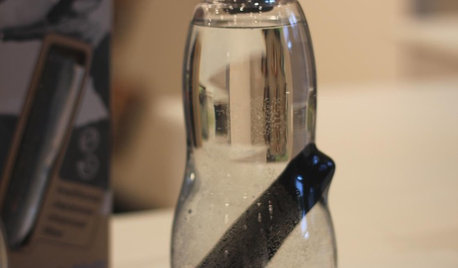water report help?
sakmeht
17 years ago
Related Stories

PETSDoghouses Worth a Wag: Report From Barkitecture 2011
Annual fundraiser sniffs out the best — and quirkiest — in Austin doghouse design
Full Story
TASTEMAKERSICFF 2012 Report: Black+Blum for Home Plus Office
Everyday items for the home and workplace — a water bottle, a dish rack — get an unconventional rethink by the award-winning British company
Full Story0

GARDENING GUIDES8 Unthirsty Plants Help You Save Water in Style
Spend less effort and money on your landscape with drought-tolerant and native plants that liven up your yard
Full Story
KITCHEN DESIGNSpecial Report: Kitchen News from Cologne
Blended Kitchen-Living Rooms, Super-Skinny Counters and Hidden Appliances Are Headed This Way
Full Story
GARDENING AND LANDSCAPINGBe a Citizen Scientist to Help Wildlife, Learn and Have Fun Too
Track butterflies, study birds, capture stars ... when you aid monitoring efforts, you’re lending Mother Nature a hand
Full Story
GREEN DECORATING8 Questions to Help You See Through Green Hype
With the ecofriendly bandwagon picking up some dubious passengers, here's how to tell truly green products and services from the imposters
Full Story
BATHROOM DESIGNSpecial Report: Bath Trends From Valencia
Spain Design News: Minimal Sinks, Stacked Vanities — and Modern Glam
Full Story
TASTEMAKERSICFF 2012 Report: 10 Visionary Problem Solvers
Sure, pretty is nice, but the best designs improve our lives. These innovative products by students and companies do just that
Full Story
Special Report: Interior Design News From Cologne
Take a Photo Tour of the Latest Furniture Innovations Headed Our Way
Full Story
DECORATING GUIDESDream Living Room Makeover Progress Report
See how our sweepstakes winner is handling life in a construction zone — and get a peek at the remodel's progress
Full Story





mutant_hybrid
petiolaris
Related Professionals
Carlisle Landscape Architects & Landscape Designers · Baltimore Landscape Architects & Landscape Designers · Eden Prairie Landscape Architects & Landscape Designers · Piqua Landscape Architects & Landscape Designers · Manchester Landscape Contractors · Allentown Landscape Contractors · Bristol Landscape Contractors · Corona Landscape Contractors · Las Vegas Landscape Contractors · Melrose Landscape Contractors · Sun City Center Landscape Contractors · Uxbridge Landscape Contractors · Welby Landscape Contractors · Tysons Corner Stone, Pavers & Concrete · North Hollywood Swimming Pool BuilderssakmehtOriginal Author
mutant_hybrid
sakmehtOriginal Author
petiolaris